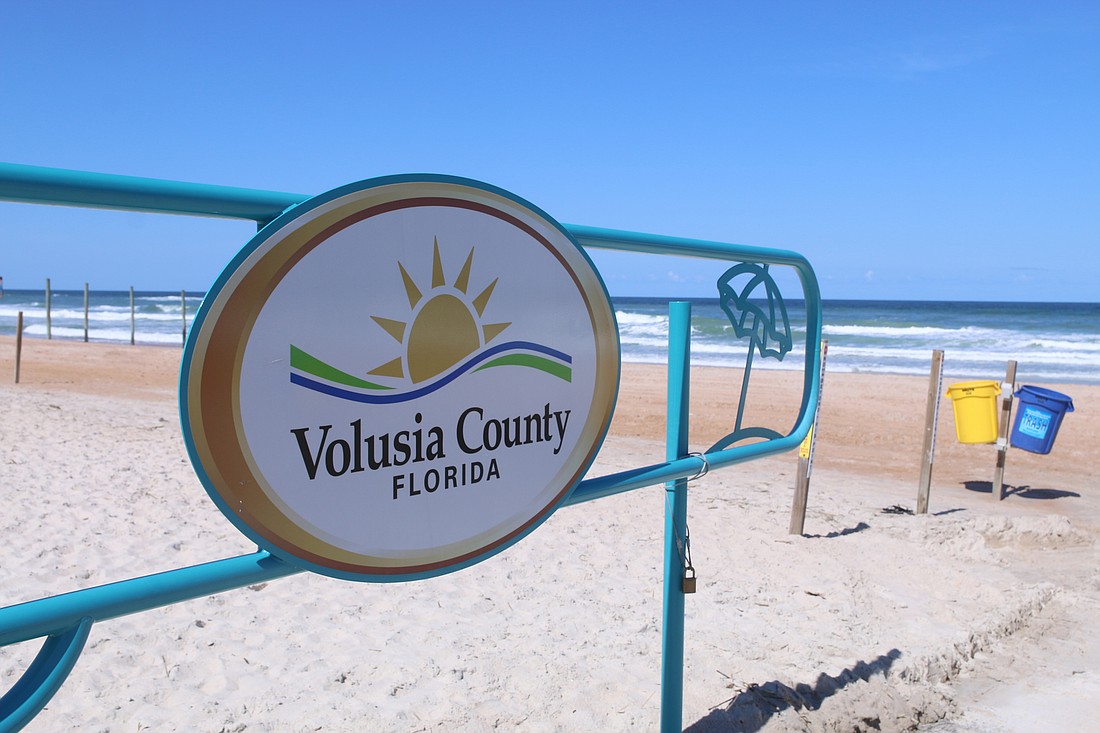- April 25, 2024
-
-
Loading

Loading

A letter by U.S. Fish and Wildlife cast a shadow of doubt over the dog-friendly beach test area proposal, causing the Volusia County Council to vote 5-2 at its meeting Tuesday, March 21, to direct staff to circle back to them with answers about the county's incidental take permit after discussing an alternate test area in Ormond Beach.
Council members Danny Robins and Matt Reinhart voted against.
The council was initially looking to implement a dog-friendly beach pilot program near Michael Crotty Bicentennial Park in Ormond-by-the-Sea, but county staff received a letter on Monday from U.S. Fish and Wildlife expressing concerns about dogs in the natural beach management area, which begins at Granada Boulevard and runs north to the Volusia-Flagler county line. There are other BMAs in the southern part of the coast as well.
"It wasn't a final determination on whether or not that would be permissive or not," Deputy County Manager Suzanne Konchan said. "But they did indicate, somewhat to our surprise, that [U.S. Fish and Wildlife] felt it would require an amendment to the Habitat Conservation Plan, and potentially a major amendment, because of its location in the natural beach management area."
The letter, Konchan said, said some review of the plan would be required regardless of the area chosen for the pilot program, but follow-up conversations with city staff determined that areas not part of the BMA would likely undergo a less rigorous process.
A proposal emerged to implement the pilot program on the stretch of beach in the city of Ormond from either Milsap Road to Rockefeller Drive, or a shorter stretch from Cardinal Drive to Rockeller Drive.
County Councilman Troy Kent said he liked the alternate location as it was more centrally-located and it is on a section of drivable beach.
But he had questions about the letter from FWS — like why is St. Johns, which he said has a take permit strikingly similar to Volusia's, allowed to have dogs on the beach? He said that when staff asked FWS they were told the agency had "no substantive reply."
“What’s right today is right tomorrow," Kent said. "What’s wrong today is wrong tomorrow. Don’t treat us differently. ... I felt like Volusia sometimes gets treated differently.”
County Council Chair Jeff Brower agreed with Kent.
"It felt like a threat," he said. "Governments should work together well and not threaten one another."
Dogs have been largely banned from beaches since 1987, when Volusia took over regulating the beach.
Dogs are currently only allowed in two beach parks, both in the south end of the county: Smyrna Dunes Park, in New Smyrna Beach; and Lighthouse Point Park, in Ponce Inlet.
The majority of comments made by the public at the meeting concerned implementing the pilot program at Bicentennial Park, with residents stating concerns about dog feces, disturbing sea turtle nests and birds, as well as dogs posing threats to children on the beach.
"This area, Ormond-by-the-Sea, currently lacks the infrastructure to mitigate pollution and disruption to the biosphere that this zone will likely nurture," Ormond-by-the-Sea resident Christopher Proctor said. "I'm worried about the impact the proposed dogs will have on the resource, this being the beach."
Ormond Beach resident Laura McGuinness said "hundreds of people" sneak dogs onto the beach and that she's never seen one person pick up the dog's waste in the 30 years she's lived in the area.
"In those 30 years, I have witnessed, personally witnessed, them take after cars, take after kids, take after people, take after birds," she said. "That's what dogs do. They chase things. ... There are plenty of other available places for these dogs to go that don't have to involve those beaches."
Nanette McKeel Petrella, president of Daytona Dog Beach, said her organization has provided the council with three different proposals for dog-friendly beach areas since 2021. She said that, should a test site be successful, they will commit a volunteer group to monitor and maintain the area.
"The demand and support for dog-friendly beach areas is undeniable, and yet there are those who seek to ignore it and potentially undermine it," Petrella said. "In listening to all those expressing their viewpoints today, what makes me the most sad is that we are allowing ourselves to be pitted against one another in an effort to derail this proposal instead of coming together to agree on something that would be fair to all."
As Volusia's incidental take permit is what allows the county to continue beach driving, council members were concerned about whether implementing a pilot program for dogs on the beach would put the permit in jeopardy.
Kent felt the concerns were driven by fear.
"Now fear mongers will have you believe that if you value beach driving, then you should not allow dogs on the beach," Kent said.
A lot of the concerns he heard from the public, he added, made it sound like dogs would be running wild on the beach, when the county would actually require them to be leashed.
The proposal comes up every few years, said Councilman David Santiago. Prior pushes to allow dogs on the beach have been unsuccessful.
"Maybe it keeps coming up because there's still enough public interest," Santiago said. "And I'm all for trying something within the right parameters."
Robins argued against the idea that "fear mongering" has prevented the council from allowing dogs on the beach.
"Since when are the facts and other people's points of view fear mongering," he said. "... I call that looking at all sides of the issue. It's also called looking at the big picture. What's good for all, not what's best for one person or what they've said to people."